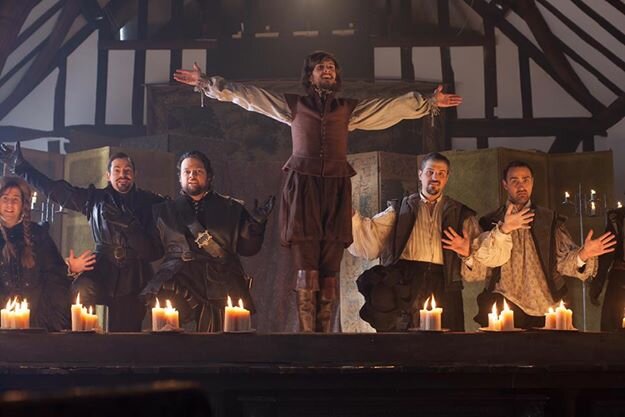Remember that “hopeless lute player” I mentioned last time?*
Did you know he had a direct effect on the composition of The Lord of the Rings?

In “On Fairy-Stories,” Tolkien gives Macbeth as an example of the incompatibility between fantasy and staged drama and argues that it’s “a work by a playwright who ought, at least on this occasion, to have written a story, if he had the skill or patience for that art.” He specifically mentions the Weird Sisters there, but he confesses in a letter to W. H. Auden that he felt “bitter disappointment and disgust from schooldays with the shabby use made in Shakespeare of the coming of ‘Great Birnam wood to high Dunsinane hill,’” and though he never says so that I’ve found, I suspect he also felt let down by the use of the idea that “no man of woman born” could harm Macbeth. (SPOILER: MacDuff, who was delivered by C-section, orders his men to hide in Birnam Wood and disguise themselves as trees before attacking Dunsinane.) Thus, in The Two Towers, Tolkien shows Fangorn Forest—the trees themselves—marching on Isengard, and though it’s said that no living man can kill the Witch-king of Angmar, he meets his fate in The Return of the King at the hands of Merry and Éowyn.

Love him or hate him, you need to know Shakespeare’s works simply because their influence on the English language and on Western culture as a whole is incalculable. For example, no less a playwright than Friedrich Schiller adapted Macbeth for the German stage, and Hamlet and Much Ado about Nothing have even been translated into Klingon. Cinematic and television versions abound; IMDb lists over a thousand, ranging from an 1898 short of Macbeth to Joss Whedon’s version of Much Ado, with dozens more in various stages of development and production, and that’s not counting loose adaptations like The Lion King, Kiss Me, Kate, and McLintock! (My current favorite is the recent Royal Shakespeare Company rendition of Hamlet with David Tennant and Sir Patrick Stewart.) And then there are commonplace phrases that originate from Shakespeare’s plays. “To be or not to be” is obvious, of course, but “sound and fury signifying nothing,” “all the world’s a stage,” “brave new world,” and many, many more show up in everyday conversation without our even realizing where they came from.
Then there are the sonnets, a form Shakespeare made uniquely his own. Many of these have also become commonplaces—“Shall I compare thee to a summer’s day?”, “Let me not to the marriage of true minds / Admit impediments,” “That time of year thou mayest in me behold,” and more—but they’ve also served as a model for sonneteers ever since. There’s even a Tumblr account dedicated to recasting !
Not too bad for a 450-year-old “upstart crow,” eh?
* The Bill Facebook team tells me a preview should be out sometime around Christmas.
 No matter what we write, we write for an audience, even if it’s only an audience of one. It doesn’t matter whether you immediately close the document without saving or burn the paper you’ve just written on—you wouldn’t put pen to paper or fingers to keyboard unless you wanted to say something to someone else. And audience awareness becomes all the more critical when you publish, regardless of medium.
No matter what we write, we write for an audience, even if it’s only an audience of one. It doesn’t matter whether you immediately close the document without saving or burn the paper you’ve just written on—you wouldn’t put pen to paper or fingers to keyboard unless you wanted to say something to someone else. And audience awareness becomes all the more critical when you publish, regardless of medium. Audience awareness doesn’t necessarily mean you have to be afraid to say something. It does mean you have to figure out the best way to say it and be willing to defend your choices if and when you receive any backlash. I know, for example, that some people in my hometown will pick up Look Behind You simply because I wrote it and be Shocked! at the fantasy elements (especially a Christian writing about Nazi necromancers!!!), generally because they’re unaware of the history I’ve incorporated. So I try to give fair warning when I talk to people, and I’ve written
Audience awareness doesn’t necessarily mean you have to be afraid to say something. It does mean you have to figure out the best way to say it and be willing to defend your choices if and when you receive any backlash. I know, for example, that some people in my hometown will pick up Look Behind You simply because I wrote it and be Shocked! at the fantasy elements (especially a Christian writing about Nazi necromancers!!!), generally because they’re unaware of the history I’ve incorporated. So I try to give fair warning when I talk to people, and I’ve written  There are limits, though, to which caveat lector applies. One is the point at which it runs up against “show, don’t tell.” A long-winded digression on why people can’t just do the right thing isn’t going to be nearly as effective as Merry challenging the Ents to take action against Saruman in movie-verse
There are limits, though, to which caveat lector applies. One is the point at which it runs up against “show, don’t tell.” A long-winded digression on why people can’t just do the right thing isn’t going to be nearly as effective as Merry challenging the Ents to take action against Saruman in movie-verse  Malone’s
Malone’s  Tolkien defines human creativity as sub-creation. Only God can create something from nothing, and Tolkien calls the world God created the Primary World. Yet humans, made in God’s image, have the right to use our sub-creative powers, defined as Art, to form Secondary Worlds from the material we find in the Primary World. Here Tolkien quotes from his poem “Mythopoeia,” which appears in full in recent editions of Tree and Leaf. Written for C. S. Lewis shortly after the famous conversation on Addison’s Walk in 1931, “Mythopoeia” attacks Lewis’ assertion at the time that myths are “lies breathed through silver.” Tolkien counters not only that myth is a vehicle for truth but also that myth-making is a human right—“we make still by the law in which we’re made.” And “Leaf by Niggle,” Tolkien’s only deliberate allegory, celebrates the idea that God may someday grant us the great gift of seeing our Secondary Worlds given primary reality.
Tolkien defines human creativity as sub-creation. Only God can create something from nothing, and Tolkien calls the world God created the Primary World. Yet humans, made in God’s image, have the right to use our sub-creative powers, defined as Art, to form Secondary Worlds from the material we find in the Primary World. Here Tolkien quotes from his poem “Mythopoeia,” which appears in full in recent editions of Tree and Leaf. Written for C. S. Lewis shortly after the famous conversation on Addison’s Walk in 1931, “Mythopoeia” attacks Lewis’ assertion at the time that myths are “lies breathed through silver.” Tolkien counters not only that myth is a vehicle for truth but also that myth-making is a human right—“we make still by the law in which we’re made.” And “Leaf by Niggle,” Tolkien’s only deliberate allegory, celebrates the idea that God may someday grant us the great gift of seeing our Secondary Worlds given primary reality. Fantasy is the most difficult genre, in Tolkien’s view, because it’s characterized by “arresting strangeness” and is vastly different from the Primary World. Yet that’s also what makes fantasy worthwhile and is a consolation in itself. It carries with it Recovery, not just renewed perspective but renewed mental and spiritual health from “regaining a clear view… ‘seeing things as we are (or were) meant to see them.’” Fantasy also allows Escape, not from reality as a whole, but from the elements that stifle our spiritual health and growth, and thus can offer the consolation of satisfied desire. Best of all is the Consolation of the Happy Ending, the good turn Tolkien calls eucatastrophe:
Fantasy is the most difficult genre, in Tolkien’s view, because it’s characterized by “arresting strangeness” and is vastly different from the Primary World. Yet that’s also what makes fantasy worthwhile and is a consolation in itself. It carries with it Recovery, not just renewed perspective but renewed mental and spiritual health from “regaining a clear view… ‘seeing things as we are (or were) meant to see them.’” Fantasy also allows Escape, not from reality as a whole, but from the elements that stifle our spiritual health and growth, and thus can offer the consolation of satisfied desire. Best of all is the Consolation of the Happy Ending, the good turn Tolkien calls eucatastrophe: